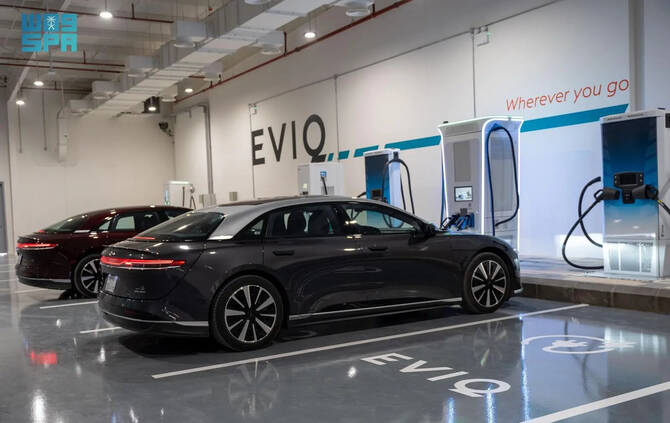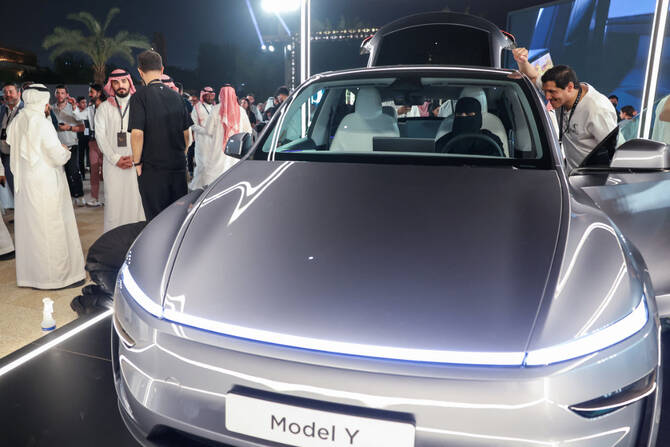RIYADH: Saudi Arabia’s electric vehicle sector is gaining traction, marked by Tesla’s first dealership in Riyadh and a growing network of charging stations, signaling increased foreign investment and a drive toward sustainability.
The momentum aligns with Vision 2030, the Kingdom’s reform plan that prioritizes sustainability and clean energy. As the government sets the stage for widespread electric vehicle adoption, companies are rapidly expanding infrastructure to meet rising local demand.
Industry leaders say the Kingdom’s approach resonates beyond its borders.

“We see Saudi Arabia’s efforts in sustainability not merely as a national initiative, but as a global inspiration,” Abdulmajeed Al-Ghamdi, general manager of sustainable solutions company ESSCO, told Arab News.
“With the development of mega-projects and smart cities powered by clean energy and intelligent mobility, we believe the future holds unprecedented potential and we are ready to be a part of it.”
ESSCO is among the companies helping to build Saudi Arabia’s EV charging network, balancing environmental priorities with user convenience. Through partnerships with leading EV charger manufacturers in Europe and China, the company has trained its workforce in installation and operational procedures.
Al-Ghamdi believes ESSCO’s nationwide maintenance expertise gives the company a competitive edge.

ESSCO and EVIQ are among the companies helping to build Saudi Arabia’s EV charging network, balancing environmental priorities with user convenience. (Supplied)
“The nature of our company, which also specializes in maintenance, gives us a significant advantage, as we already have high caliber maintenance teams distributed across various regions in the Kingdom,” he said.
“This widespread presence allows us to deploy resources quickly and efficiently, minimizing downtime and ensuring timely project execution.”
To align with regulatory standards, ESSCO collaborates with the Saudi Electricity Company and the Ministry of Municipal and Rural Affairs. ESSCO is also addressing the unique challenges posed by the Kingdom’s vast terrain and extreme climate.
DID YOU KNOW?
• EVs don’t emit exhaust gases, improving air quality and reducing greenhouse gas emissions.
• The global EV market is expected to reach $1.57 trillion by 2032.
• China leads the global EV market, accounting for some 58 percent of global EV production in 2023, driven by its top automaker, BYD.
“These standards are based on rigorous data and research provided by SASO, which plays a crucial — though sometimes under-recognized — role in advancing sustainability efforts in the Kingdom,” Al-Ghamdi said.
Rather than viewing the harsh climate as a hurdle, ESSCO sees it as a chance for innovation.
“Drawing from our extensive experience with solar energy systems in both public and private sector projects, we are actively working on integrating solar power and energy storage solutions into our EV charging infrastructure,” Al-Ghamdi explained.

“By capitalizing on Saudi Arabia’s abundant natural sunlight, we are helping pave the way for a more self-sustaining and resilient charging network.”
The company’s work highlights the growing cooperation between the public and private sectors in building a sustainable EV infrastructure.
“We closely follow the significant role played by the Public Investment Fund in driving large-scale investments in the EV sector,” Al-Ghamdi explained.
Opinion
This section contains relevant reference points, placed in (Opinion field)
PIF has played a central role in advancing the Kingdom’s EV industry, most notably through its backing of Lucid, a US-based electric vehicle manufacturer.
Lucid established the Kingdom’s first EV production facility and became the first global automaker to join the “Made in Saudi” program — a milestone in localizing high-tech manufacturing and promoting national industrial growth.
The firm’s assembly plant in Jeddah’s King Abdullah Economic City, which opened in September 2023, is already operational, with a full-scale manufacturing facility expected by 2026.
“I’m very proud of the team, what we’ve been able to accomplish in Saudi Arabia — the first-ever international automotive manufacturing plant in the Kingdom,” Faisal Sultan, vice president and managing director of Lucid Middle East, told Arab News earlier this year.
Lucid is not the only player driving Saudi Arabia’s EV ambitions.
Ceer, the Kingdom’s first homegrown electric vehicle brand, is also preparing to launch its debut model in 2026. The company’s production facility is designed for an annual output of 240,000 units, CEO Jim DeLuca told Arab News earlier this year.
Despite global headwinds, DeLuca remains optimistic — but realistic — about the pace of EV adoption.
In the same interview, he acknowledged that global market growth has been slower than expected, noting that product quality, affordability, infrastructure and government incentives will determine how quickly Saudi Arabia transitions to EVs.
“The Ministry of Investment is working on ecosystem incentives to accelerate EV adoption,” DeLuca said. “We see steady growth in the early days, but incentives will be key to making EVs the catalyst for Saudi Arabia’s automotive transformation.”

Backed by the PIF, both Lucid and Ceer benefit from an expanding web of financial support, industrial licensing and regulatory frameworks. These tools have created fertile ground for a local EV ecosystem — one that attracts international players while empowering domestic champions.
The Kingdom’s ambitions stretch beyond manufacturing.
In 2023, the Electric Vehicle Infrastructure Co. inaugurated a research and development center in Riyadh, reinforcing Saudi Arabia’s push toward becoming a regional innovation hub. That same year, the Kingdom launched its first EV fast-charging station in the capital, marking a critical milestone in public infrastructure readiness.

Charging station of the Electric Vehicle Infrastructure Company. (Supplied)
Saudi Arabia’s bold push into the EV market signals more than just an economic pivot; it positions the Kingdom as a leader in environmental transformation across the Middle East.
With Vision 2030 in full swing, the country has committed billions to electrifying its transport sector. Its dual-track strategy — nurturing local brands like Ceer while partnering with global manufacturers like Lucid — underscores a long-term commitment to sustainability.
Adding momentum to this shift, Tesla opened its first dealership and service center in Saudi Arabia in April 2025, marking a key milestone in its Middle East expansion. The flagship Riyadh location offers the Model 3, Model Y and Cybertruck. Tesla also plans pop-up stores in Jeddah and Dammam, along with new Supercharger stations and service centers.

People arrive to attend Tesla's official launch ceremony in Riyadh on April 10, 2025. (AFP)
The effort comes as the region, long dependent on oil exports, faces growing international pressure to decarbonize. By advancing EV adoption, Saudi Arabia is setting a new tone — one focused on reducing transport-related carbon emissions and improving urban air quality in cities such as Riyadh and Jeddah.
EV adoption is only part of the equation. With parallel investments in renewable energy — including solar and green hydrogen — the Kingdom is laying the groundwork for a carbon-neutral power grid. This transition could eventually allow EVs to operate with net-zero emissions, amplifying their environmental impact.
Regionally, Saudi Arabia’s leadership is likely to influence policy beyond its borders.
As the largest economy in the Arab world, the Kingdom’s bold approach to sustainable mobility may push neighboring Gulf states to follow suit — whether through regulatory reform, infrastructure development or public-private collaboration.




















